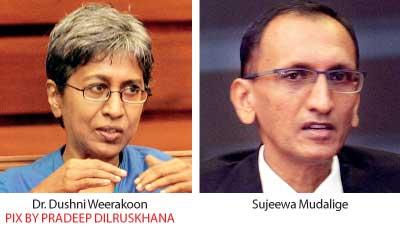23 Nov 2022 - {{hitsCtrl.values.hits}}
The private sector representatives and economists took aim at the inexplicably massive defence allocation in Budget 2023, at a time when the country is facing no major security threats and when large swaths of the population are undergoing the worst living conditions, being pushed into starvation and poverty.
Budget 2023, at a time when the country is facing no major security threats and when large swaths of the population are undergoing the worst living conditions, being pushed into starvation and poverty.
PwC Sri Lanka Chief Executive Officer Sujeewa Mudalige said the budget had allocated a thumping Rs.532 billion for both defence and public security, which according to him, doesn’t make sense, given Sri Lanka being an island and having completed 13 years since the end of the conflict.
He showed that defence spending has continuously increased in every budget and if left unchecked, it could easily touch a trillion rupees per annum in the next couple of years.
“As a taxpayer, I have to say this and I believe most of the taxpayers here will agree. The elephant in the room is defence,” Mudalige told a recent post-budget forum, commenting on the expenditure rationalisation.
“We are spending Rs.500 billion to maintain the tri forces and police. That’s a huge amount of money.
I think one thing we have forgotten is that we are an island nation and it has been 13 years since the end of the conflict. I think a review is required on this,” he remarked.
Pointing out to the Easter Sunday attacks the country experienced in 2019, despite the ever-increasing allocation, he said, “the quantum of defence spending doesn’t mean that you are more secure”. He also asked those who were present at the forum to imagine the level of transformation that could be made in the areas of social security, health, education and skill development with only a 10 percent of the defence budget reallocated into each of these areas. While acknowledging the need to revisit the defence spending, Treasury Secretary Mahinda Siriwardana said such expenditure remains extremely rigid but the budget lays the ground to rationalise expenditure over the medium term, as complete reset is impossible and impractical in a year beset by the worst economic crisis.
“It is very rigid the defence expenditure and it is very little that you can do in the short term. You at least need three to four years to put in place reforms,” Siriwardana said.
Meanwhile, echoing similar sentiments, Institute of Policy Studies Executive Director Dr. Dushni Weerakoon emphasised the importance of reallocating resources to provide social security to the poor and vulnerable, who became disproportionately affected by the ongoing crisis.
“We have to release resources from unproductive areas where public sector is number one, whether it is the armed forces or a public service and reallocate those resources to support economic activities that drive growth as well as the poorer segments of the population,” Dr. Weerakoon said.
She also said she would have liked to see more proposals and reforms from the budget to support recovery and reboot growth, which puts the low-income segment at its front and centre.
“Because the kind of the crisis we are in is not something we will overcome in a year or two. Even if you return to a positive growth in 18 months or so, there is a long way for us to go to catch up the output that we have lost. And we may never actually fully recover the output lost in these two to three years,” Dr. Weerakoon added.
06 Nov 2024 11 minute ago
06 Nov 2024 1 hours ago
06 Nov 2024 2 hours ago
06 Nov 2024 3 hours ago
06 Nov 2024 4 hours ago